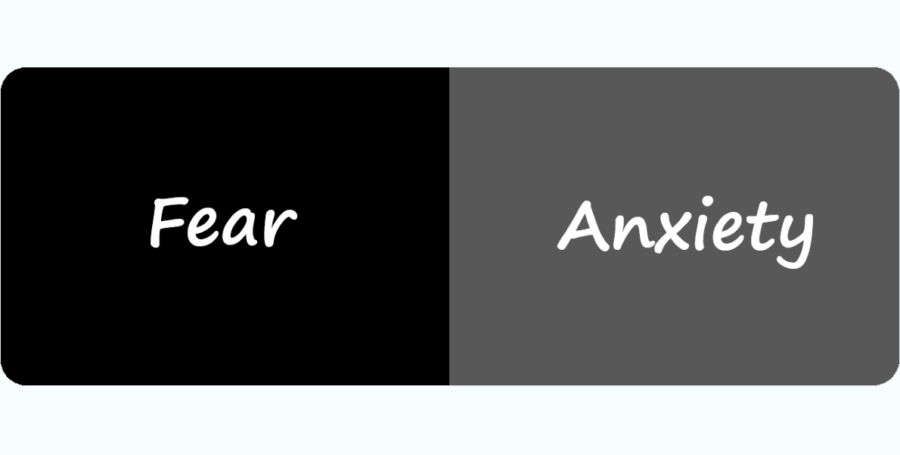Fear and anxiety. Are they similar or different? Does fear create anxiety or does anxiety create fear? Are the words fear and anxiety interchangeable? Physiologically, do they feel the same?
While physiologically they can feel the same (heart palpitations, sweating, etc.), in actuality, they are very different. Fear is based on a fight or flight response and is triggered by your five senses, sight, smell, sound, taste and touch. Anxiety is a response to a threat that may not even exist!
Fear
Fear is a perfectly normal and rational emotional response to a known or perceived threat. Fear is in response to a clear and present danger, for example, hearing breaking glass at your back door or seeing a car careening out of control toward you.
Fear is about survival. It is what triggers:
- Fight, ready for battle
- Flight, fleeing
- Freeze, paralysis
- Frenzy, agitation
- Fawning, making nice
When you feel fear, your senses will be heightened. You hear the breaking glass in your back door window and you become hypervigilant listening for other signs of danger.
When you are in that heightened state of arousal you are forced to pay attention to your fear. It is right there, waiting for the fight or flight. Your physical response is one of the differences between fear and anxiety.
Without a healthy dose of fear, the human race would not have survived, nor would you as an individual have survived. Fear only becomes problematic when it fails to achieve its purpose, which is to manage and respond effectively to the situation at hand. When it turns to anxiety fear blocks emotional growth, making you incapable of progress.
Anxiety
Anxiety is a natural, normal, healthy, protective reaction to your environment. There is nothing wrong with feeling anxiety. However, it is an emotion that can easily get out of control.
Anxiety is about what might happen. It is about the possibility or potential of something bad happening. It can be a vague sense of anticipation and/or apprehension. It is your mind’s interpretation of danger, but it is not imperative for your survival.
With anxiety, sometimes it is difficult to determine its origin. Anxiety can be a reaction to your fear. Or, your anxiety can be triggered by something that has happened in the past. Alternately, anxiety can keep you alert but can cause emotional harm when it goes “too far”.
You could be anxious about things that never affect you. However, anxiety can sometimes be a source of strength. You may feel you need to be super organized, and more self-disciplined if you are anxious. You may plan, even excessively, for unforeseen situations and events that others might ignore or procrastinate.
Because people who are anxious are concerned about even minor physical ailments, they may even be in better physical shape than the general population that puts off going to the doctor until it is a major issue.
Just like there’s a difference between fear vs anxiety, there is also a difference between feeling anxious and having an anxiety disorder. An anxiety disorder is a mental health condition. It’s normal to be anxious in certain situations, but if you have feelings of anxiety over a long period of time and in inappropriate situations, it may be a sign that you have an anxiety disorder.
Is it Fear or Anxiety?
Fear and anxiety are frequently confused because they both bring about similar physiological responses. The biggest difference is the intensity of those physiological responses. The physiological response of anxiety can feel very intense, to the point of feeling like you are having a panic attack or even a heart attack.
To determine if what you are experiencing is fear or anxiety, you can ask yourself one question: Is my heightened response based on an actual threat or perceived threat? For example, you are walking in the woods and you see a bear ahead on your path. You have a very strong physiological response. That is fear.
Your physiological response can be just as strong or stronger if you are walking in the woods and you think a bear might be lurking around the corner. Even if a bear has never been sighted in your walking area, if you think a bear might be somewhere close, you head will be on a swivel looking everywhere. Your reaction is based on a potential threat.
Fear, as a normal reaction, may increase your ability to manage reality, whereas anxiety may limit you and may paralyze you to manage life situations.
Fear requires a trigger, for example, the bear on your path. Anxiety does not. Just the anticipation of a lurking bear is enough to cause anxiety. Anxiety unaddressed can lead to panic attacks, anxiety on steroids.
Relationships Relearned: Learn. Unlearn. Relearn
To be in a healthy, successful relationship, what you learned in childhood about relationships may need to be unlearned and relearned in a different way as an adult.
Perhaps when you were a child, you were exposed to a parent who had fears and anxiety about the unknown. It could be a fear of:
- The dark
- Strangers
- Global warming
- Spiders or snakes
All of these fears and anxieties of a parent were visited on you. For you to have a successful adult relationship, you will have to unlearn the fears and anxieties of your parent. To face your fears of snakes or spiders you may need to learn to differentiate from the poisonous varieties and the ones that may be creepy, but are harmless.
If you have fears and anxieties and do not work to relearn healthy skills for managing your fear and anxiety, your relationship with a significant other will likely suffer. Symptoms of anxiety in relationships may be exhibited by:
- Continually seeking reassurance, for example, clinginess
- Being dependent, for example, not wanting to be alone
- Striving to avoid rejection, for example, feeling like an imposter
- Tension, for example, hesitant communication
- Being socially avoidant, for example, seeming to be emotionally unavailable
Another way anxiety can cause problems in relationships is that the person with anxiety may feel have excessive worry, anger or irritability. Striving to be perfect, and avoid rejection, can be draining on both people in the relationship.
For the person with anxiety, learning new skills to manage your anxiety will be crucial. Also see: How to Decrease Anxiety Using Your Five Senses and Is Worry The Same as Anxiety
For the person living with someone who has anxiety, patience and understanding will be key factors in a successful relationship. Understanding anxiety and what it is will go a long way to being patient when symptoms of dependence and seeking reassurance crop up.
Summary
Most people, when faced with fear, will experience the physical reactions that are similar to anxiety. It can be a vicious cycle where fear can cause anxiety and anxiety can cause fear. Although the focus of the responses is different in fear vs anxiety, fear and anxiety can be interrelated. When someone is faced with fear, anxiety can be productive when it is not excessive. In fact, the goal of therapy is to reduce anxiety, not eliminate it.
With warmest regards,
Thank you so much for reading this blog. If you enjoyed the content, please check out other blogs at:
https://relationshipsrelearned.com/my-blog/
https://rvingnomads.com/blog/
You can view my available books on my Amazon Authors Page or go to the books tab at the top of this page
To be notified of future posts, please enter your email address and click on the Subscribe button.












